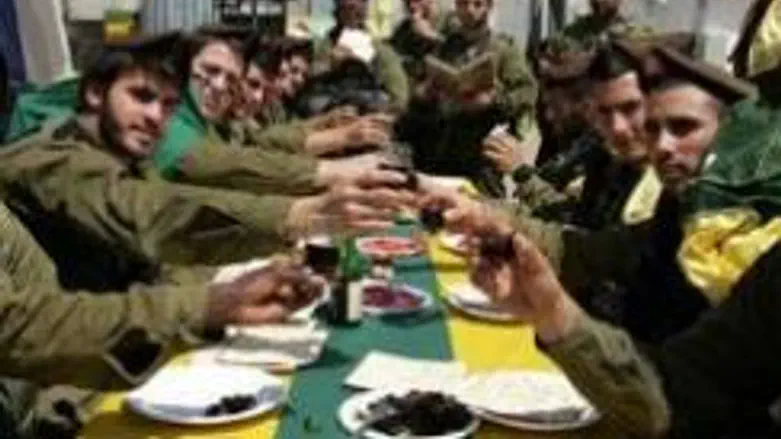
The IDF is finishing this year's preparations for Passover with stronger border security, classes in Torah, and more than 71 tons of matzah. The goal of the preparations – to give IDF soldiers an enjoyable and spiritual Passover experience, while protecting Israel during the holiday.
The IDF goes on high alert on Jewish holidays, as terrorist groups often time their attacks to coincide with holidays in order to hit larger crowds of people and do maximum damage to Israeli morale. This year, extra troops will be stationed between Palestinian Authority-controlled cities in Judea and Samaria and Israeli population centers, as well as along Israel's borders, around Gaza, and even in the skies and at sea.
The military rabbinate is doing its best to provide a Passover seder to all soldiers on active duty during the holiday. Seders will be held in major IDF bases, in small outposts, and even on submarines. Soldiers doing guard duty in the field will be given individual trays of food, allowing them to conduct their own seder.
Lone soldiers' seder
Chief of Staff Gabi Ashkenazi will meet with hundreds of “lone soldiers,” young soldiers whose parents do not live in Israel, at a special seder hosted in their honor. This will be the ninth consecutive year that the IDF and the Agudah L'maan HaChayal (Association for the Wellbeing of Israel's Soldiers) sponsor a seder for lone soldiers.
Lone soldiers and soldiers from families suffering financial hardship will each be given a 200 shekel gift certificate.
71 tons of matzah
In order to host the hundreds of seders it has planned, the IDF has purchased 71 tons of matzah, seven tons of fish, three tons of chicken, 60,000 kosher for Passover chicken shnitzels, 4.5 tons of Passover cookies, 8 tons of matzah meal, and 13,000 bottles of grape juice.
"Since soldiers aren't in the army during Passover by choice, it's our obligation to give them a memorable experience,” Major Rabbi Eliezer Emmanuel of the Gaza division explained to Arutz Sheva. The Rabbinate's efforts to make the holiday an enjoyable one pay off, he said, “Each year I'm touched to see soldiers staying at the table to continue singing after the seder ends.”